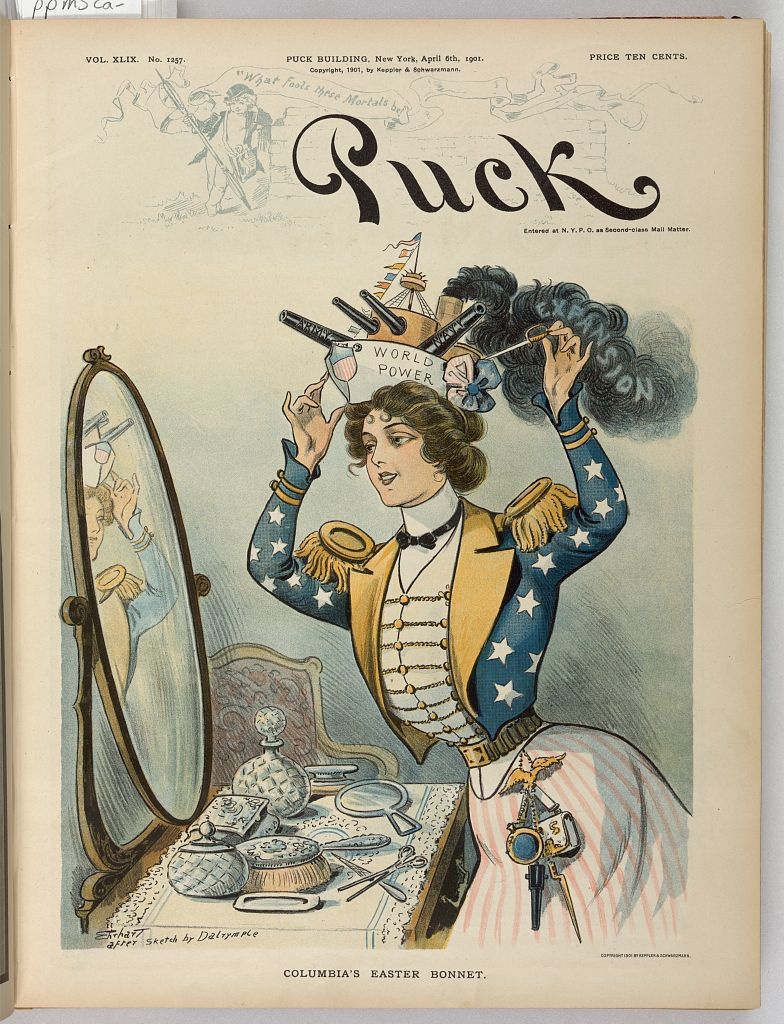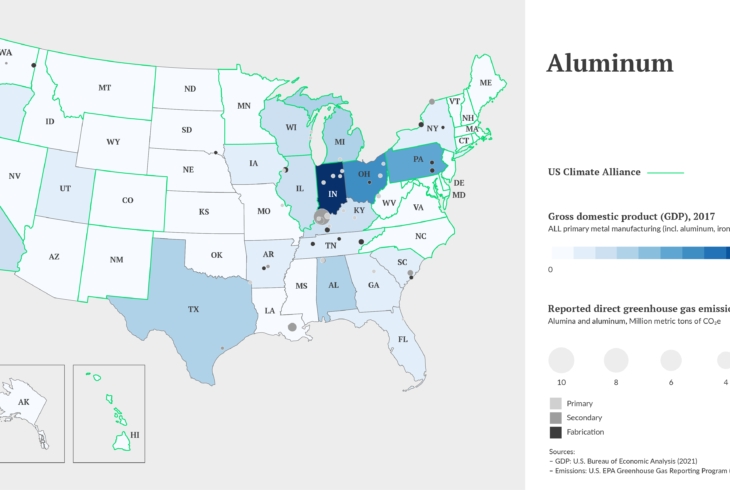- cross-posted to:
- hackernews@lemmy.bestiver.se
- cross-posted to:
- hackernews@lemmy.bestiver.se
McKinley lived during a period (and, indeed, was an influential figure) when the U.S. became a global superpower.
No.
The US only became a superpower – preeminent among the great powers – during the Cold War, well after McKinley was dead.
The US was becoming a great power in the era back then. There’s a neat Puck political cartoon from the time that shows Columbia, the national personification of the US, trying on a new hat that reads “world power”. That is, the US wasn’t just some bit player way off in the boonies anymore. Two years prior, she had actually fought and won a war with Spain (which was very much not one of the strongest European powers at that point, probably couldn’t be considered a great power any more).
kagis

Title: Columbia’s Easter bonnet
Ehrhart after a sketch by Dalrymple.
Summary: Illustration shows Columbia adjusting her bonnet, which is a battleship labeled “World Power” with two guns labeled “Army” and “Navy”; it is spewing thick black smoke labeled “Expansion.” She is inserting a tiny sword as a hatpin to hold it in place.
But the US still wasn’t a superpower. Militarily, it was much weaker than the other great powers – the US had a small, weak peacetime army, and the US Navy, which was the US’s strong point militarily, was not even close to Germany or the UK’s navies even in World War I.
It did have a strong economy. IIRC, the US bypassed the British Empire’s GDP sometime in the late 1800s.
But the bar to be a superpower is pretty high, and the US didn’t meet it until quite a bit later.
https://en.wikipedia.org/wiki/Superpower
Superpower describes a sovereign state or supranational union that holds a dominant position characterized by the ability to exert influence and project power on a global scale. This is done through the combined means of economic, military, technological, political, and cultural strength as well as diplomatic and soft power influence. Traditionally, superpowers are preeminent among the great powers. While a great power state is capable of exerting its influence globally, superpowers are states so influential that no significant action can be taken by the global community without first considering the positions of the superpowers on the issue.
EDIT: Apparently, I’m actually being too generous on the GDP. Estimates here are that US GDP surpassed UK GDP around 1890. US GDP did not surpass British Empire GDP until around World War I:
https://www.quora.com/When-did-the-US-overtake-the-UK-in-GDP
[continued in child]
[continued from parent]
They are not afraid to manipulate the map in order to expand American influence, including an annexation of Greenland, an assertion of rights to the Panama Canal, and a seizure of Gaza.
These aren’t real moves (well, Gaza, maybe, though if so, I expect it’d be some kind of UN mandate type thing, as has existed in the past). Trump has run a long series of provocative statements in the past that are quite decoupled from what he’s actually done in office. Invading Canada was mentioned early in his first term, and he’s done it again.
The goal is to expand the markets for American industry, whether that be in the Arctic Circle, the Western Hemisphere, the Middle East or even in Outer Space, a new frontier for resource exploitation and commercial enterprise (asteroid mining, space tourism, etc.).
No. Hell, McKinley isn’t even a great example of the US gaining access to new markets – you’d want to roll back from that to something like the Perry Expedition under Filmore. Today, world markets are pretty open. If you wanted to complain about protectionist markets today, you’d complain about something like India.
A lot of the political fighting in the US for a long time was over tariffs on manufactured goods. That was effectively a domestic fight – tariffs drove up the prices of manufactured goods, which benefitted manufacturing states up north at the expense of agricultural states in the south. Those advocating for tariffs weren’t principally aiming to get more access to foreign markets, but to get a larger share of the wealth from agriculture.
What Trump has publicly complained about, which I doubt very much should be taken as a face value representation of his or the administration’s concerns, is balance of trade (and, specifically, on a bilateral basis). Bilateral trade balances aren’t a concern of economists. You expect imbalance on a country-by-country basis. What they are, however, is something that members of the public who don’t have that background are sometimes concerned about. Trump has a history of taking an item of public concern and then engaging in political theater to give a great impression that he is addressing it. That is decoupled from his administration’s actual policy, though.
Like McKinley, Trump also sees tariffs as a means of shifting the burden of revenue collection from taxation of Americans via an Internal Revenue Service to taxation of foreigners via an External Revenue Service. Trump parrots long-held beliefs inside Libertarian and corporate circles about the evils of domestic taxation.
First, that’s small-l “libertarian” unless you mean the Libertarian Party. In general, right-libertarians are more than fine with international trade – they’re one of its stronger advocates in the American political scene. If you take Cato as an example, they currently have an article up bitterly complaining about Trump’s proposed use of tariffs:
https://www.cato.org/commentary/reciprocal-tariffs-are-trumps-worst-trade-idea-yet
‘Reciprocal Tariffs’ Are Trump’s Worst Trade Idea Yet
Alas, you will be shocked to learn that it is not actually that simple, and that—in the real world—“reciprocal tariffs” would be a catastrophically bad idea for all sorts of reasons, most of which have nothing to do with one’s stance on tariffs, free(ish) trade, or U.S. trade agreements.
Under a reciprocal system, however, these and other customs rules and procedures would matter not for a few products and countries but for every single thing entering the United States—trillions of dollars’ worth of goods each year—no matter their origin or their complexity. Related costs would accordingly skyrocket.
A truly reciprocal system would lower U.S. tariffs to match the tariffs of these and other trading partners, but, given the politics here, there’s effectively zero chance of that ever happening.
Who wants tariffs? People who are globally-uncompetitive and make whatever is being protected, since that transfers wealth away from other people in the country to them. Trump has gotten himself in the news for being supportive of manufacturing tariffs – steel, aluminum, cars. Those are things that the Rust Belt wants, which are swing states. Here’s aluminum:

That is, it’s good politics, but in general, tariffs aren’t a great way to open access to foreign markets. You can use them as leverage to try to negotiate free trade agreements from other countries that lower their barriers to trade, but that’s the exact opposite of what Trump has tried to do – he has presented himself as someone opposed to free trade agreements. He tried to take credit for TPP and TTIP falling through under Obama, and made a huge deal out of potentially tearing up NAFTA.
He’s aiming to score political points from people who like the idea of a high-paying, low-skill assembly-line industry coming back. That’s an artifact of a globally-different economic situation in the world – it’s not going to happen today, and Trump hasn’t actually done a lot to try to actually push that, but he’s gone to a lot of effort to make it look like he’s doing so.
Finally, Trump is a man of grievances, and one of his continual grievances has been that America is taken advantage of by the rest of the world.
I would say that a very substantial part of this should not be taken at face value. That is, that position is one that sells well with a chunk of the public whose support Trump wants, and a large part of the way one gets political support is by saying things that they agree with. More interesting to watch what the administration actually does, and we’ve a good four years of Trump in office to refer to on that point.
can lemmings post some information about the links they post on lemmy?
why do you think this article is interesting?
just a citation of a paragraph that left it’s mark on you
a tldr
anything




